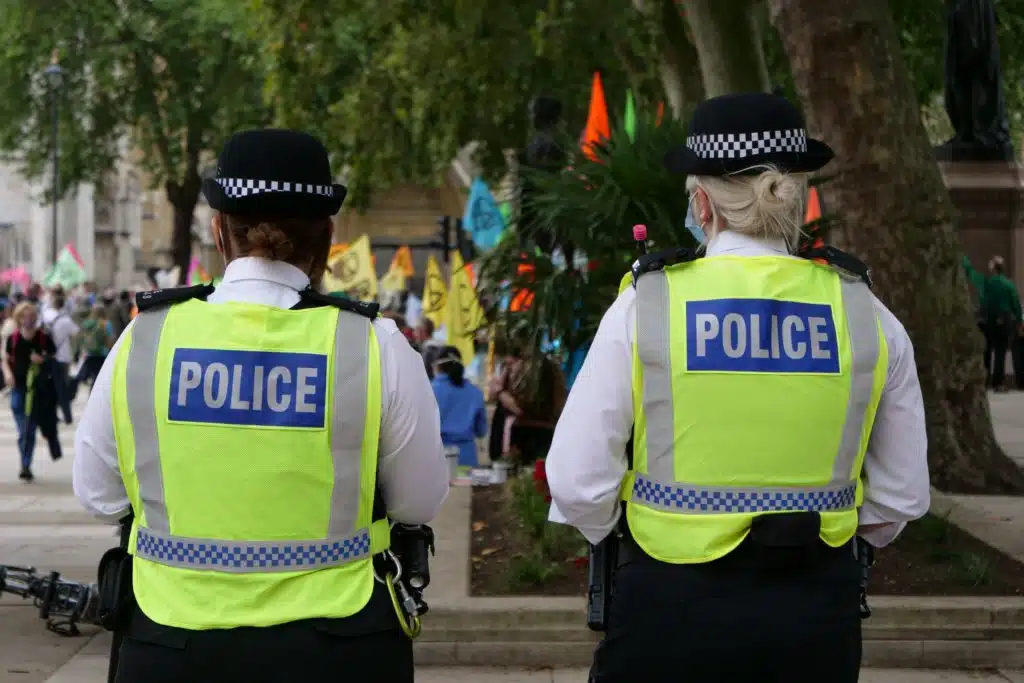The police have been praised by Her Majesty’s Inspectorate of Constabulary and Fire & Rescue Services for responding proactively to prevent domestic abuse and protect victims during the COVID-19 pandemic.

COVID and subsequent lockdowns had placed domestic abuse victims at great risk, the HMICFRS said, but praised police forces for working proactively with partners to find new ways to protect victims and utilising technology.
Refuge’s National Domestic Abuse Helpline, which signposts callers to specialist services across the country, saw calls and contacts rise by an average of 61% compared to pre-pandemic.
Her Majesty’s Inspector of Constabulary Zoë Billingham said: “Victims of domestic abuse were at greater risk during the COVID-19 pandemic when lockdown restrictions made it even harder to escape their abusers. The police responded proactively by communicating with known victims, reaching-in to those locked down, rather than waiting for them to reach out. We saw brilliant examples of forces up and down the country using innovative new ways to keep victims safe during the pandemic. I applaud forces for this. I also want to thank frontline officers who bravely risked their own safety to attend domestic abuse incidents throughout the lockdown periods.”
Examples of proactive and innovative ways of supporting victims used by some police forces included:
- Sending links for virtual appointments to victims which left no trace on the victim’s phone or computer, which their abuser may check
- Working with businesses, including hairdressers and banks, to improve understanding of the signs of abuse or provide a safe space for victims
- Running media campaigns to promote the “silent solution” system for emergency contact, where someone calling 999 can press 55 if they are not able to speak
- Using online platforms to disclose information to potential victims about a partner’s history of abuse, where previously this had to take place at a police station.
The inspectorate said that while the police had innovated throughout the pandemic, it still had some concerns about how the police responds to domestic abuse longer-term.
On average, three in every four domestic abuse crimes reported to the police are closed without the perpetrator being charged. This situation has gradually worsened over the last five years. The inspectorate also has significant concerns about court backlogs, which whilst not for the police to solve, may increase the likelihood of victims disengaging from the criminal justice process. The inspectorate recommends police should:
- Immediately review why so many domestic abuse cases are discontinued, and whether more can be done to support vulnerable victims.
- Ensure that domestic abuse victims who are waiting for court hearings are safeguarded and can continue to access support
- Work with partners and domestic abuse victims to understand why many victims choose not to report to the police to reduce barriers to reporting
- Ensure new practices adopted during the pandemic, such as online contact with victims, are properly monitored for quality and safety.
Zoë Billingham said: “The police have shown they are dedicated to protecting victims of domestic abuse, but we still have some concerns about the longer-term response. While we know that not all victims want their case to go to court – and in fact some crimes are reported by third parties – we want the police to take the right action, using the powers only they have to protect victims. It’s a huge concern that on average, three in every four domestic abuse related crimes are closed by the police without the perpetrator being charged. Many forces are unable to explain the reasons why so many perpetrators are not being brought to justice. Today we are calling on all forces to immediately review why so many domestic abuse cases are being closed without any further action taken and to take steps to address this.”
“Despite these concerns, there has been a positive shift over the last few years with the police prioritising domestic abuse, and victims should not be discouraged from reporting. The police have improved their understanding, identification and recording of domestic abuse, while continuing to find new and innovative ways to support victims,” she concluded.
However, Refuge raised some “serious concerns” about the inspection report. Lisa King, OBE, Refuge director of communications and external affairs said that despite a 15% increase in arrests between April and June 2020 compared to the same period in 2019, the charging rate has dropped – from 23.2% in 2016 to 9% in 2020.
Given just one in five survivors ever report to the police, the reality is that “a vanishingly small number of survivors of domestic abuse will ever see their perpetrator charged, let alone convicted”.
“These statistics are against the backdrop of a sharp rise in the number of calls and contacts logged by Refuge’s National Domestic Abuse Helpline during the pandemic. Our Helpline, which acts as a gateway to specialist services across the country, saw calls and contacts rise by an average of 61% compared to pre-pandemic. While specialist services remain overwhelmed with demand, in stark contrast, the number of domestic abuse calls to many police forces decreased in the first part of 2020, before returning to normal levels,” said Lisa King.
“This doesn’t add up – and does show yet again the lack of confidence women experiencing domestic abuse have in a criminal justice system which is riddled with institutionalised misogyny and repeatedly fails women,” she added.
The inspection highlights an “unacceptably high use of outcome 16” where 54.8% of domestic abuse cases were discontinued because women did not support police action.
“Refuge knows first-hand the huge range of reasons why women withdraw support – fear of repercussions from their perpetrator, trauma, and the widespread distrust of the police and wider criminal justice system. This is why Refuge has long-supported evidence-led prosecutions and welcomes the inspectorate’s recommendation that the police urgently review the use of this outcome. We also support the recommendation that the police review their use of outcome 15, which cites ‘evidential difficulties’ as the reason for dropping cases. The police must be better trained in evidence gathering in domestic abuse cases,” said Lisa King.
She warned that in domestic abuse cases involving migrant women – these problems are compounded yet more. Refuge is concerned that migrant women experience even more barriers to reporting for fear their information will be shared with immigration officials.
“This practice must stop and a firewall urgently introduced between the police and immigration enforcement if women are to feel safe enough to report.”
“Year after year, inspection after inspection, we see police reports which show abject failure to women and children who experience domestic abuse. What sort of a message does this send to women who need support? The police are failing in their duty to protect women and children who experience domestic abuse – an overhaul of the police response is much overdue. With two women being killed every week in England and Wales women’s lives depend on changes being made swiftly,” concluded Ms King.
Review of policing domestic abuse during the pandemic – 2021


